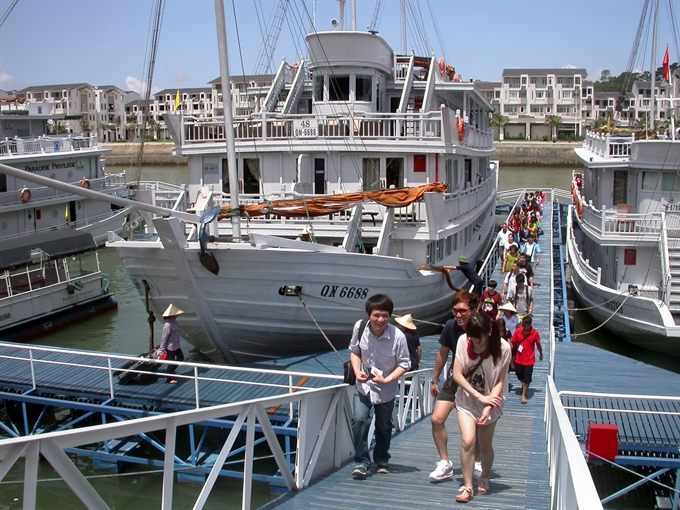 Economy
Economy

Việt Nam has long strived to tap its immense maritime potential to become a rich and strong country based on its marine economy. Yet this goal comes with its own challenges due to a lack of sustainable development solutions.
 |
| Tourists in Hạ Long Bay, one of Việt Nam’s biggest draws. The country has long strived to tap its immense maritime potential to become a rich marine economy. — VNS Photo Đoàn Tùng |
Thúy Hiền
HÀ NỘI - Việt Nam has long strived to tap its immense maritime potential to become a rich and strong country based on its marine economy. Yet this goal comes with its own challenges due to a lack of sustainable development solutions.
In 2007, the 10th Party Central Committee adopted Việt Nam’s Maritime Strategy towards 2020 to further enhance a sea-based economy and protect national sovereignty over islands and seas. The strategy set out a goal that sea-based economic sectors will make up 53-55 per cent of the country’s gross domestic product (GDP) while per capita income in coastal areas is expected to double the average of the whole country by 2020.
Now, nine years down the line, the sea-based economic sector has considerably contributed to the national economy.
Across the country, home to a 3,260km coastline and nearly 3,000 islands, there are 44 seaports with a designed capacity able to handle 470-500 million freights per year. Six coastal economic zones incorporating a variety of sea-based industries were developed during 2013-2015. Government policies in developing fishing and aquaculture have resulted in a considerable increase in the number of iron-clad and wood-clad fishing vessels for offshore fishing. Sea tourism contributes up to 70-80 per cent of the whole tourism sector, capitalising on the long beautiful coastline and famous resort islands.
However, experts say the development of a sea-based economy is still carried out with a mindset of ‘exploitation’, rather than ‘efficient and sustainable development’.
Exploitation has been mostly focused on substance-form or living natural resources, while intangible values of the marine eco-system and marine space do not receive due attention.
Assoc. Prof. and Dr. Nguyễn Chu Hồi, former Deputy General Director of Việt Nam Administration of Seas and Islands said the thought of ‘take-it-all’ and ‘kill-it-all’ in marine-resource exploitation has led to a rapid degradation of the natural environment and exhaustion of resources, including the country’s key resources of oil and gas.
“Marine biodiversity is depleted to an alarming level. Aquatic product reserves in our seas have reduced by 16 per cent compared to in 2010.
“To make matters worse, the sea environment is being threatened by both natural
and man-made disasters like oil spills, red tide, or toxic pollution,” he said.
The recent environmental disaster in four central provinces by wastewater discharge from Hưng Nghiệp Formosa Hà Tĩnh Steel Company clearly shows a big loophole in management and supervision of industrial projects in terms of their environmental protection aspect.
“We are falling short of balancing environmental protection and economic development. We are still prioritising short-term over long-term interests,” Hồi said, adding that the incident also showed the lack of a national plan to prevent and tackle marine environmental disasters.
Scientists and environmentalists said it was high time the authority carried out thorough screening of investment projects right at their initial phase. The environment should not be traded for economic interest, they said.
Minister of Environment and Natural Resource Trần Hồng Hà agreed with the opinion. He admitted shortcomings in assessing environmental impact reports of investment projects, saying that they had so far been just a formality in order for projects to attain approval from the authority.
He said the Government and the ministry would work to repair the loopholes and set out specific regulations for investment.
“We must take into consideration how much a project spends on production, and how much on environment,” he said, adding that in the coming time, the ministry would lay emphasis on attracting investment on clean and renewable energy as well as environmental projects.
Lack of co-ordination
Another matter of concern in the development of a sea-based economy is the lack of co-ordination in policy making and implementation among localities, regions, and industries.
Experts say this makes development plans dispersed and ineffective despite the fact that the government has come out with many solutions regarding this matter.
Hồ Công Hường, from the Institute of Development Strategy (Ministry of Investment and Planning) said it was crucial to clearly divide roles and responsibilities among related parties or entrusting a certain party the highest responsibility in carrying out certain policies or solutions.
He also raised the issue of protecting offshore fishermen whose role is vital in a
sea-based economy as well as in protecting national sovereignty over islands and seas, amidst a recent increase of incidents involving illegal fishing in international waters or attacks on fishermen.
He asked for an issuance of a single governmental document that covers safety protection, consular assistance, guarantees and insurance – all matters that help better guarantee fishermen’s interests.
“This will be sort of a handbook for fishermen when they go to sea. In case incidents occur, both in international or domestic waters, fishermen will know to what extent the government could be involved to help. It will make it easier for both the government and fishermen to solve problems,” he said. — VNS




